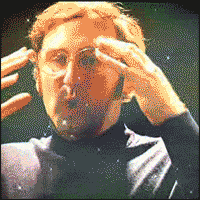[Noam Chomsky, from Understanding Power]
WOMAN: Noam, I’ve noticed that in general there’s a strong strain of anti- intellectualism in American society.
When you say there’s “anti-intellectualism,” what exactly does that mean? Does it mean people think Henry Kissinger shouldn’t be allowed to be National Security Advisor?
WOMAN: Well, I feel there’s a sense in which you’re looked down on if you deal with ideas. Like, I’ll go back and tell the people I work with that I spent the whole weekend listening to someone talk about foreign policy, and they won’t look at that in a positive way.
Yeah, because you should have been out making money, or watching sports or something. But see, I don’t call that “anti-intellectual,” that’s just being de-politicized— what’s especially “intellectual” about being concerned with the world? If we had functioning labor unions, the working class would be concerned with the world. In fact, they are in many places— Salvadoran peasants are concerned with the world, they’re not “intellectuals.”
These are funny words, actually. I mean, the way it’s used, being an “intellectual” has virtually nothing to do with working with your mind: those are two different things. My suspicion is that plenty of people in the crafts, auto mechanics and so on, probably do as much or more intellectual work as plenty of people in universities. There are big areas in academia where what’s called “scholarly” work is just clerical work, and I don’t think clerical work’s more challenging mentally than fixing an automobile engine— in fact, I think the opposite: I can do clerical work, I can never figure out how to fix an automobile engine.
So if by “intellectual” you mean people who are using their minds, then it’s all over the society. If by “intellectual” you mean people who are a special class who are in the business of imposing thoughts, and framing ideas for people in power, and telling everyone what they should believe, and so on, well, yeah, that’s different. Those people are called “intellectuals”— but they’re really more a kind of secular priesthood, whose task is to uphold the doctrinal truths of the society. And the population should be anti-intellectual in that respect, I think that’s a healthy reaction.
